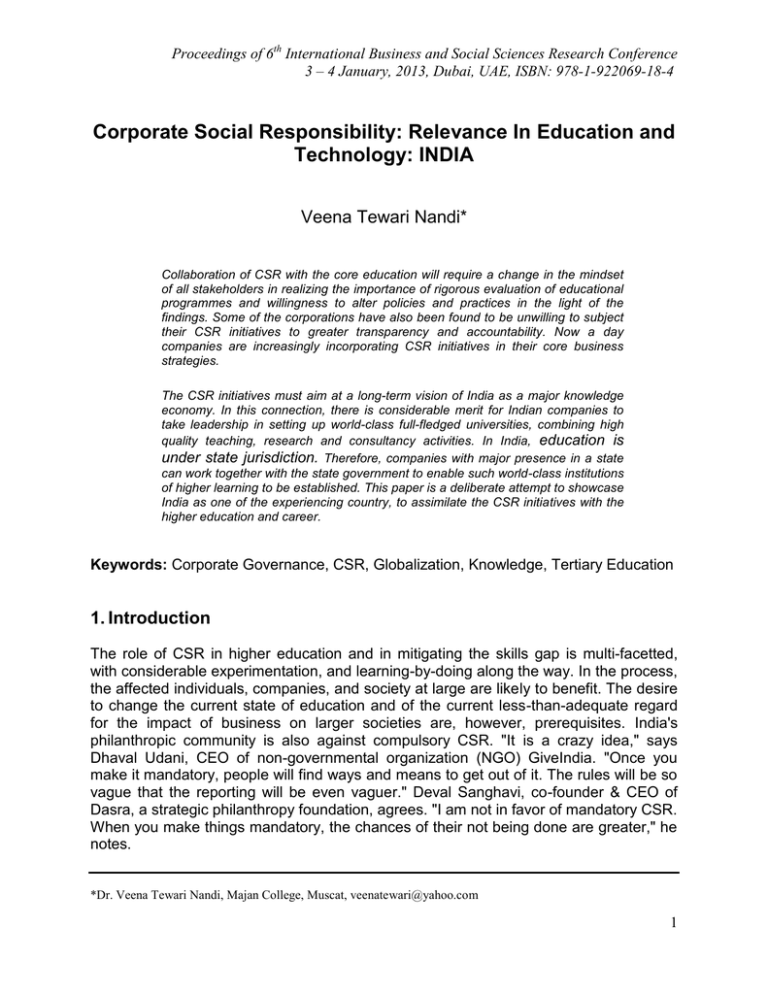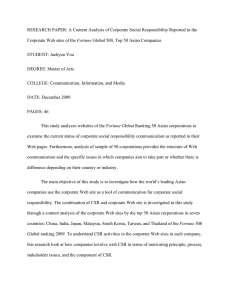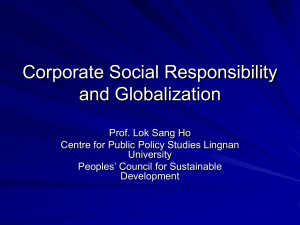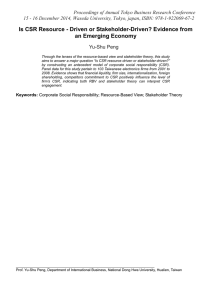Proceedings of 6 International Business and Social Sciences Research Conference
advertisement

Proceedings of 6th International Business and Social Sciences Research Conference 3 – 4 January, 2013, Dubai, UAE, ISBN: 978-1-922069-18-4 Corporate Social Responsibility: Relevance In Education and Technology: INDIA Veena Tewari Nandi* Collaboration of CSR with the core education will require a change in the mindset of all stakeholders in realizing the importance of rigorous evaluation of educational programmes and willingness to alter policies and practices in the light of the findings. Some of the corporations have also been found to be unwilling to subject their CSR initiatives to greater transparency and accountability. Now a day companies are increasingly incorporating CSR initiatives in their core business strategies. The CSR initiatives must aim at a long-term vision of India as a major knowledge economy. In this connection, there is considerable merit for Indian companies to take leadership in setting up world-class full-fledged universities, combining high quality teaching, research and consultancy activities. In India, education is under state jurisdiction. Therefore, companies with major presence in a state can work together with the state government to enable such world-class institutions of higher learning to be established. This paper is a deliberate attempt to showcase India as one of the experiencing country, to assimilate the CSR initiatives with the higher education and career. Keywords: Corporate Governance, CSR, Globalization, Knowledge, Tertiary Education 1. Introduction The role of CSR in higher education and in mitigating the skills gap is multi-facetted, with considerable experimentation, and learning-by-doing along the way. In the process, the affected individuals, companies, and society at large are likely to benefit. The desire to change the current state of education and of the current less-than-adequate regard for the impact of business on larger societies are, however, prerequisites. India's philanthropic community is also against compulsory CSR. "It is a crazy idea," says Dhaval Udani, CEO of non-governmental organization (NGO) GiveIndia. "Once you make it mandatory, people will find ways and means to get out of it. The rules will be so vague that the reporting will be even vaguer." Deval Sanghavi, co-founder & CEO of Dasra, a strategic philanthropy foundation, agrees. "I am not in favor of mandatory CSR. When you make things mandatory, the chances of their not being done are greater," he notes. *Dr. Veena Tewari Nandi, Majan College, Muscat, veenatewari@yahoo.com 1 Proceedings of 6th International Business and Social Sciences Research Conference 3 – 4 January, 2013, Dubai, UAE, ISBN: 978-1-922069-18-4 The world over, very few countries have a CSR requirement; Saudi Arabia is possibly the only exception. "The laws in developed countries do not stipulate mandatory CSR contributions," according to KPMG partner (development sector practice) Sudhir Singh Dungarpur. "In the recent past, many European countries have specified that companies must include CSR information in their annual reports." 2. Literature Review “Corporate executives have an obligation as global citizens to play a role on the world stage, but they should understand that this role requires them to balance two, extremely delicate, sets of responsibilities: they must address the urgent issues of our times, without overstepping the boundaries of democratic legitimacy, and they must contribute to the public welfare, without neglecting their primary role as generators of private wealth. We are both leaders and statesmen. Although there are those who would like us to be neither." James D. Wolfensohn, President, World Bank, Washington DC. What is Knowledge? Different philosophers have approached the question of what comprises knowledge differently i.e., best reflected by a comparative analysis of the views of Karl Popper, Thomas Kuhn, Michel Foucault and Karl Popper, which revolves around two essential questions: • How do we produce knowledge? • Is this knowledge a socio-economic construction? Knowledge is a complex phenomenon, which cannot be defined in one succinct sentence. The inclusion of a number of variables and categories make the task of defining it cumbersome. At lot of places in literature regarding CSR there are traces of the transition taking place in developing countries (with specific reference to Asia and examples from India) into the knowledge economy. In these countries there have been continued barriers to its success that starts with an understanding of the notion of knowledge society with particular focus on the growth of knowledge economy as discussed by Bell, Toffler, Cairncross and Leadbeater. But in the future, governments and business need to avail opportunities where they can play a role of being growth promoters of the knowledge-based economy. One of the earliest and most influential exponents of the knowledge society developed out of the writings of a conservative American sociologist Daniel Bell in The Coming of Post industrial Society. Bell emphasizing on the centrality of theoretical knowledge observed that the balance of employment between agriculture/extractive manufacturing sectors of the economy and service sectors had been steadily shifting in favor of the service sector–a fact that is as much applicable to developing countries particularly in Asia since the 1980s. 2 Proceedings of 6th International Business and Social Sciences Research Conference 3 – 4 January, 2013, Dubai, UAE, ISBN: 978-1-922069-18-4 As India struggles to raise the living standards of the bottom half of its population, such institutions can incorporate vocational training institutes to offer practical, livelihoodearning skills to these people. This can supply a ready pool of skilled labor to enhance the manpower resources of the state and therefore also the parent company. Such an institute can also train the increasing population of people over 60 years to remain economically self-sufficient post retirement. Given the global economic crisis, and the need for India to structure its own developmental path, there is a strong case for setting up institutes of sustainable development. Such institutes can help reorient growth to more fully reflect resource scarcities, including those relating to energy and environment. Such institutes can also be valuable in helping to experiment with more sustainable and frugal social and economic consumption and production patterns. Developing world and the knowledge economy: In the last thirty years developing countries particularly Asia, has witnessed the growth of a whole new range of knowledge. However in every arena (old as well as new) enduring research work has not always been undertaken to the extent necessary. Neither have the communication technologies, the key to market economy, significantly revolutionized Asia. The location and size of major corporations operational in the region are no longer of significance with the emergence of relatively cost effective technologies coupled with global access to capital means a factor that has often worked to Asia’s disadvantage. The forces of globalization have furthered the negative forces and strengthened the asymmetric nature of the region vis-a vis other regions of the world (creating a ‘digital divide’), failing to integrate it in a manner advantageous towards realizing long term socio-economic development, peace, and stability. 3. Propositions & Perspectives Corporate Social Responsibility (CSR) in the context of Globalization: Any analysis of CSR in the present context cannot avoid an understanding of the process of globalization as marked by two distinct tendencies, one of increasing integration and interdependence and the other of increasing disintegration and dependence. Corporate globalists thus see interdependence as an opportunity not only for profit making but also for economic development amongst the developing and underdeveloped countries. According to the UN Secretary General Kofi Annan, “If we cannot make globalization work for all, in the end it will work for none. Thus it is essential to enlist the help of businesses in building the missing links in social infrastructure of the new global economy”. “Globalization has to create value for everyone, not just shareholders. Good corporate governance is essential for this to happen”, according to Jacques Manardo, Global Managing Partner for Strategic Clients at Deloitte Touche Tohmatsu, France during his address at the World Economic Forum. In practice, companies have to consider the interests of other stakeholders - consumers, employees and civil society as a whole”. This "model" exists in some form or other in Europe and Japan. On the whole, companies are compelled to balance the interests of the various stakeholders as 3 Proceedings of 6th International Business and Social Sciences Research Conference 3 – 4 January, 2013, Dubai, UAE, ISBN: 978-1-922069-18-4 part of good business practice and legal obligations. From a philosophical viewpoint, "companies are there to serve society". Globalization could lead to benchmarks, better jobs, higher standards of living, but could result in some countries being left behind, with the gap between developed and developing countries broadening to the detriment of all. Thus, two key areas need to be managed by corporations, along with governments in the process of globalization, talents (and the mobility of people with talents in demand) and trade. Developing countries need to learn to develop and also retain talent, and that requires a revamp of much of its culture including education infrastructure, legal systems, immigration policies and management policies, while arts and entertainment facilities will need to adapt to meet changing demands and more international tastes. A free and open trade and investment environment is necessary, but achieving agreement between many countries and cultures is difficult. A harmonious symbiosis of Global-Local approach incorporating a sense of social responsibility is required by corporations to help developing countries through their transition to knowledge societies. Whereas corporate governance reflects the interests of shareholders but not of other stakeholders, corporate social responsibility, however one chooses to define the term, implies that a company is responsible for its wider impact on society. In this era of globalization necessitating effective corporate governance, corporations have increasingly come to realize the need to share a common vision of corporate social responsibility though the contents and issues which it would encompass and the priority accorded to them would differ. Successful businesses realize the benefits of deep community ties, creating path-ways of exchange of information, energy and ideas. Increasingly companies are separating community management from public relations by opening up separate offices. CSR & Education The notion of corporate social responsibility is especially crucial in the case of developing or underdeveloped countries. In the case of mining companies of Latin America their earlier paternalistic relations with local communities resulted in suppressing initiatives in education. That relationship has now changed to greater partnerships with local communities. Therefore social responsibility is a means of managing risk and avoiding a big price to pay for lack of involvement. The case of Microsoft’s investment in India in different ways in the sphere of education (Project Shiksha) and health (namely in terms of eradication of HIV/AIDS) are worth emulating by other corporations. The case of Malayampa natural gas power project in the Philippines is worth mentioning in Shell’s commitments towards sustainable development. SmithKline Beecham's aim to eliminate elephantiasis, and Liz Claiborne's efforts to increase awareness of domestic violence are some of the examples of corporations increasingly taking on the mantle of social responsibility. 4 Proceedings of 6th International Business and Social Sciences Research Conference 3 – 4 January, 2013, Dubai, UAE, ISBN: 978-1-922069-18-4 4. Current Situation/ Findings In this present era of globalization as corporations are becoming more aware of their social responsibilities the traditional responses of companies contributing to good causes are dramatically changing from mere philanthropy. Despite the worthwhile support given by many corporations, an enormous amount could still be done. If companies each invest in one good cause with the same fervor, which they invest in their bottom lines, a huge step could be taken towards easing many of the world's social woes, particularly poverty eradication are it through investments in health education, knowledge management, etc. One of the key steps would be to thoroughly understand the local environment in which most companies operate. For corporations operating specially those operating from developed and developing countries in the developing and underdeveloped countries, bridging the divide (digital, economic, social or environmental) in order to eliminate poverty should be the essence of the social agenda. Over 550 million of the country’s population is currently under the age of 25 years, but only 11% of those in the 17-23 age-groups (compared with an average of 23% for the world, 55% for developed countries and 31.5% for Brazil, Russia and China) are enrolled in tertiary institutions, producing about 3 million graduates annually. Moreover, the Indian graduates, more than 60% of whom are from generic, non-professional disciplines, are unsuitable for knowledge economy work without further training. Challenges encountered by business in the developing world: The major challenges faced by business towards reducing the ‘digital divide’ existent within and amongst the countries of the developing world, including India can be identified as follows: • Governmental barriers arising from differences in forms of government and types of regime marked by excessive regulation in important spheres highlights the crucial issue of absence of good governance and requisite political will. • Financial barriers dependent on the level of economic development due to lack of adequate resources and the failure to avail of cost-effective technologies. • Technological barriers stemming from the non-availability of adequate infrastructural facilities. • Social barriers that are a result of the economic and cultural disparities between the elite minority and the vast majority. • Cultural barriers due to educational disparities raise the crucial issue of how to make the educational significance of Internet and the consequent access to plethora of information relevant to the majority of the world populace. 5 Proceedings of 6th International Business and Social Sciences Research Conference 3 – 4 January, 2013, Dubai, UAE, ISBN: 978-1-922069-18-4 5. Conclusion In the broader business perspective, we can say that CSR activities have given employees a platform to interact and make strong bonds within the organization. "The employees are motivated by such activities and thus, the hierarchy is broken, which has built solid relationships. This in turn, creates a healthy work environment in the organization. The result is higher productivity and great leadership skills," leaders believe. The Indian industry is facing a large skill gap in various sectors and this needs to be addressed urgently. Over the next five years, India will experience a paradox of nearly 90 million persons joining the workforce, but most will lack the requisite skills and the mindset for productive employment, or for generating incomes through self employment. The focus should mainly on four service sectors — ITES, banking, retail and healthcare. Various measures, including changes in human resource policies of the public sector banks, to match skills with future job requirements have to take place. The challenges in addressing the skill gaps are multi-dimensional and require cooperative efforts by all stakeholders. However, the primary responsibility for providing the foundation for manpower development, for India’s emerging knowledge economy, must lie with the government. Nevertheless, corporate social responsibility (CSR) initiatives, through partnerships between business organizations, the government, particularly at the local level, and notfor-profit sector, can play a vital role in enabling increased access to higher education through both demand-side (e.g. provision of scholarships, general awareness programmes) and supply-side measures (e.g. provision of endowments, making corporate staff available as resource persons, funding research and by contributing to infrastructure). There is increasing consensus that well-designed CSR initiatives could assist companies domestic and foreign, operating in India, to sustain long-term growth and profitability, while increasing acceptability to local population. The CSR initiatives which are integral to the business and reflect enlightened self-interest are more likely to succeed than those undertaken as charity. Access to tertiary education remains relatively low in India. The immediate need is to provide bridging training for those graduating from tertiary institutions, a sustainable strategy must focus on strengthening the educational foundations at the primary and secondary levels, increasing access and de-politicising and de-bureaucratising the higher education sector. Broader social and economic goals of providing access to education are inconsistent with micro managing, crude social engineering such as reservations and quotas set on arbitrary basis without any sunset clauses, and creating unnecessary hurdles in expanding supply in education sector. The current education policies and mindset must be changed, if India is to not only reduce the skills gap but also to provide productive livelihoods to the growing number of young persons entering the labor force. Several Indian corporations have developed synergistic initiatives towards higher education and vocational training. The illustrative examples include Tata’s Institute of Hotel Management at Aurangabad and ITC 6 Proceedings of 6th International Business and Social Sciences Research Conference 3 – 4 January, 2013, Dubai, UAE, ISBN: 978-1-922069-18-4 Welcomgroup’s Hotel Management Institute, HUL’s Project Shakti and other CSR education initiatives, ITC’s e-Choupal, Reliance’s DA-IICT providing graduate and undergraduate education in Gujarat and Intel’s higher education programme. Innovations in the design and delivery mechanisms, which could be generated by such CSR initiatives, can help provide a solid empirical base for more effective educational policies, as well as provide feedback from the stakeholders for business innovations. References Colin Mcginn, 199, Knowledge and Reality, Clarendon Press, OUP, Oxford. David Goldblatt (ed), 2000, Knowledge and the Social Sciences: Theory, Method and Practice, Routledge, New York. Daniel Bell, 1996, Malcolm Waters, Routledge, London and New York. Frank Webster, 2000, Theories of the Information Society, Routledge, London and New York. Gordon Graham, 1999, The Internet: A Philosophical Inquiry, Routledge, London and New York. http://info.worldbank.org/etools/docs/library/57494/saswati-paper.pdf 7 Proceedings of 6th International Business and Social Sciences Research Conference 3 – 4 January, 2013, Dubai, UAE, ISBN: 978-1-922069-18-4 8







